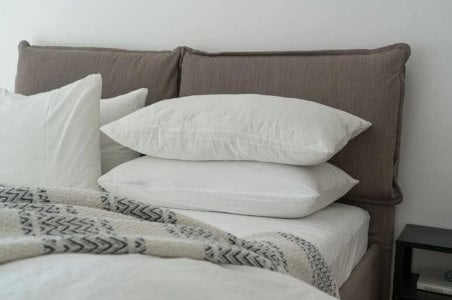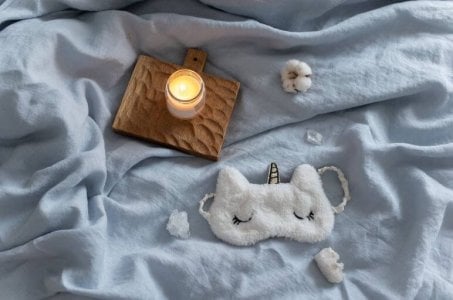How too little sleep could be ruining your health – and what you can do to fix it
- Replies 6
We all know that getting eight hours of sleep is important – but sometimes we’ve got plans that keep us busy and up later than usual, so it just might not be possible for some.
However, if you find yourself only getting six hours of sleep regularly, you might want to think about making some changes.
Skimping on sleep can have some pretty serious consequences for our health, according to Sleep Expert Olivia Arezzolo. Without seven to eight hours of sleep, expect physical, mental, and emotional effects on your body.
She revealed that everything, from memory to cognitive function, stress levels, emotional well-being, and even our skin and overall health is impacted by getting less sleep. Additionally, you are four times more likely to get a cold if you keep yourself up at night.
‘For our physical energy levels, sleep is vital,’ Olivia explained.
She continued: ‘Some 70 per cent of HGH (human growth hormone) is produced in deep sleep, which is not only responsible for skin health but every single cell in the body.’
Olivia added you are likely to ‘feel worn out and exhausted’ if your body has inadequate time to produce these hormones.
She revealed that when we sleep, our brains ‘detoxify’ from a neurotoxin that leads to brain fog, memory loss and even Alzheimer’s disease.
‘After one night of insufficient sleep, the stress hormone cortisol can increase up to 37 per cent, leaving us feeling wired, anxious and on edge,’ she added.
Olivia also warned that the long-term impact of lack of sleep is worse; ranging from an increase in the risk of cardiovascular diseases to type two diabetes, and anxiety disorders.
Fortunately, it’s easy to change your sleeping habits according to the sleep expert. Olivia also shared her 10-step bedtime routine that she follows religiously.
One tip is to practise deep belly breathing and meditation, to ease your body into a relaxed state. She also said she likes to drink tea and ‘banishes’ any blue light before bed – that means no phones in bed.
‘Know that blue light, the spectrum of light suppressing melatonin and contributing to sleep difficulties, is emitted from your bathroom's ceiling lights as well as the bedroom and your phone,’ she said.
You can find Olivia’s 10-step bedtime routine below:
Not a fan of Olivia’s 10-step bedtime routine? Well, she also said you can just focus on three tips to help you fall asleep faster. You can find those (plus her explanations) here.

What can you say about Olivia’s tips, members? Will you try some of them out? Let us know your thoughts in the comments section!
However, if you find yourself only getting six hours of sleep regularly, you might want to think about making some changes.
Skimping on sleep can have some pretty serious consequences for our health, according to Sleep Expert Olivia Arezzolo. Without seven to eight hours of sleep, expect physical, mental, and emotional effects on your body.
She revealed that everything, from memory to cognitive function, stress levels, emotional well-being, and even our skin and overall health is impacted by getting less sleep. Additionally, you are four times more likely to get a cold if you keep yourself up at night.
‘For our physical energy levels, sleep is vital,’ Olivia explained.
She continued: ‘Some 70 per cent of HGH (human growth hormone) is produced in deep sleep, which is not only responsible for skin health but every single cell in the body.’
Olivia added you are likely to ‘feel worn out and exhausted’ if your body has inadequate time to produce these hormones.
She revealed that when we sleep, our brains ‘detoxify’ from a neurotoxin that leads to brain fog, memory loss and even Alzheimer’s disease.
‘After one night of insufficient sleep, the stress hormone cortisol can increase up to 37 per cent, leaving us feeling wired, anxious and on edge,’ she added.
Olivia also warned that the long-term impact of lack of sleep is worse; ranging from an increase in the risk of cardiovascular diseases to type two diabetes, and anxiety disorders.
Fortunately, it’s easy to change your sleeping habits according to the sleep expert. Olivia also shared her 10-step bedtime routine that she follows religiously.
One tip is to practise deep belly breathing and meditation, to ease your body into a relaxed state. She also said she likes to drink tea and ‘banishes’ any blue light before bed – that means no phones in bed.
‘Know that blue light, the spectrum of light suppressing melatonin and contributing to sleep difficulties, is emitted from your bathroom's ceiling lights as well as the bedroom and your phone,’ she said.
You can find Olivia’s 10-step bedtime routine below:
1. Remove any blue light from phones (or other electronic devices) and keep your bedroom as a ‘sleep sanctuary’.
2. Block out blue light from light fixtures (such as ceiling lights) from the bedroom, and restrict this two hours from bedtime.
3. Set a ‘good night’ alarm for your phone. Switch it off at a specific time to lessen the temptation of using it in bed.
4. If you have a diffuser, you can diffuse lavender either onto your pillows or the entirety of your bedroom to help you relax.
5. Take a shower or bath about 45 to 60 minutes before bed, this can help you relax as well.
6. Drink chamomile tea about an hour before bed. Chamomile tea has calming effects on the body.
7. Taking a magnesium supplement can help muscles relax (but ask your GP first if this is safe for your health!).
8. Practising gratitude is a good way to ‘reset’ your mind and focus on the good things in your life.
9. Meditating is also a good way to help induce sleep faster.
10. Lastly, practise deep breathing because it makes it easier to sleep and calms you down instantly.
Not a fan of Olivia’s 10-step bedtime routine? Well, she also said you can just focus on three tips to help you fall asleep faster. You can find those (plus her explanations) here.
Key Takeaways
- Getting only six hours of sleep regularly makes you more susceptible to catching a cold, according to leading sleep expert, Olivia Arezzolo.
- She said sleep deprivation can have physical, mental and emotional knock-on effects, including brain fog, memory loss, anxiety and a weakened immune system.
- You can take charge of your sleep by following a few simple steps, such as establishing a bedtime routine, avoiding blue light exposure, and meditating before bed.









